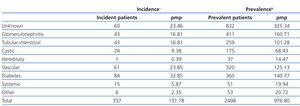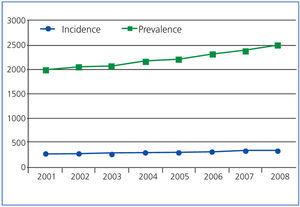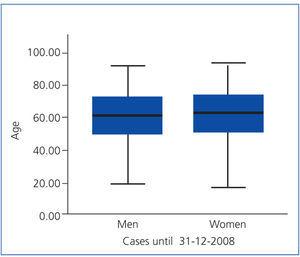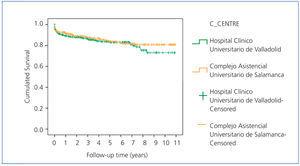Introducción: La enfermedad renal crónica (ERC) es un problema importante de salud pública. El trasplante renal se relaciona con el aumento de la supervivencia y con la mejora en la calidad de vida. Objetivos: Describir las características sociodemográficas y clínicas de los pacientes registrados en Castilla y León. Realizar un análisis de supervivencia de los pacientes sometidos a trasplante y de sus injertos. Evaluar la supervivencia en función del centro de trasplante. Métodos: Estudio descriptivo con datos recogidos hasta 31 de diciembre de 2008 en el Registro de Diálisis y Trasplante Renal de la Comunidad de Castilla y León (REDI). Descripción general de los pacientes, diferenciando incidentes de prevalentes. Se realizaron análisis de supervivencia utilizando el método de Kaplan-Meier. Resultados: A 31 de diciembre de 2008, había 2.498 pacientes en tratamiento sustitutivo renal (TSR) (976,8 pacientes por millón de población, pmp); en 2008, 337 iniciaron tratamiento (131,8 pmp) y 94 fueron sometidos a trasplante (36,8 pmp). La causa más frecuente de ERC en pacientes incidentes es la diabetes (25,0%), seguida de las enfermedades vasculares (18,1%). En pacientes prevalentes las causas más frecuentes son glomerulonefritis (16,5%) y diabetes (14,4%). Hay diferencias (p = 0,0021) en la edad de inicio del tratamiento, según grupo de enfermedad (en prevalentes también, p <0,0001). En los 11 años estudiados, se realizaron 1.062 trasplantes (1.012 pacientes). En este período, la probabilidad de supervivencia del paciente es del 81,076% (± 0,023). De los 838 pacientes con primer injerto funcionante, la probabilidad es del 89,336% (± 0,016). Del total de injertos practicados, 879 son funcionantes (83%). La supervivencia media del injerto está comprendida entre 8,7 y 9,3 años, con un intervalo de confianza del 95%. Conclusiones: La gran mayoría de trasplantes realizados en los últimos 11 años siguen funcionando. No hay diferencias al comparar la supervivencia del injerto en los centros autorizados en Castilla y León (p = 0,358).
Introduction: Chronic kidney disease (CKD) is an important public health problem. Kidney transplantation is associated with increase survival and improvement of quality of life. Objectives: To describe the sociodemographic and clinical characteristics of patients registered in Castilla y León. To perform a survival analysis of transplant patients and their grafts. To evaluate survival depending on the transplant centre. Methods: Descriptive study with data collected until 31 December 2008 from the Registro de Diálisis y Trasplante Renal de la Comunidad de Castilla y León (REDI). The data was described differentiating prevalent and incidents patients. Survival data was assessed with the Kaplan-Meier method. Results: On 31 December 2008, 2.498 patients were on Renal Replacement Therapy (RRT) (976.8 pmp); in 2008, 337 started treatment (131.8 pmp) and 94 received kidney transplant (36.8 pmp). The first cause of CKD for incident patients is diabetes (25.0%), followed by vascular deseases (18.1%). For prevalent patients: glomerulonephritis (16.5%) and diabetes (14.4%). Differences (p = 0.0021) were observed for the treatment initiation age, group of disease and prevalent patients (p <0.0001). During 11 years 1.062 transplants were performed in 1.012 patients and 879 are still functioning (83%). In this period, the survival probability for the transplant patients is 81.076% (± 0.023), and for the 838 patients with first functioning graft is 89.336% (± 0.016). Median graft survival is between 8.7 and 9.3 years (95% confidence). Conclusions: Most of the transplants during the last 11 years are still functioning. There are no differences when comparing graft survival at the approved centers in Castilla y León (p = 0.358).
INTRODUCTION
Chronic kidney disease (CKD) is an important public health problem. According to recent studies, CKD could affect approximately 4425 000 adults in Spain (9.16% of the population), and approximately 7% of them suffer the most severe form of kidney failure.1-3
When CKD reaches the terminal stage, the patient needs renal replacement therapy (RRT), which involves one of two different purification techniques: peritoneal dialysis or haemodialysis, and transplant. Currently, over 45 000 patients in Spain are undergoing RRT, and each year, 6000 new patients opt for one of the two different treatment options.4-6 The number of affected patients could reach 80 000 in the next ten years due to the progressive aging of the population and the increase of other chronic processes, such as diabetes mellitus, which frequently cause CKD.7-9
These figures show the possible health, social, and personal costs of RRT for terminal kidney failure patients in Spain, which could become an especially relevant problem.
In order to respond to the continuous demand for reliable information regarding the evolution of CKD patients, the Health Department of the Autonomous Community of Castilla y León created the Registro de Diálisis y Transplante de la Comunidad de Castilla y León (REDI) in March 2001, which has provided a resource for viewing the evolution of patients with this disease as well as those that receive transplants, with the end goal of evaluating the efficacy of the health network from a management point of view. REDI forms part of the Registro Español de Enfermos Renales (Spanish Registry of Renal Patients), which has been managed and coordinated by the Spanish National Transplant Organisation (ONT) since 2006. The ONT elaborates reports for comparing information between the different autonomous communities and national information. Additionally, REDI participates in the Registry of the European Renal Association – European Dialysis and Transplant Association (ERA-EDTA Registry), which allows for analysing and comparing diseases and treatments between countries.10
Currently, efficient health alternatives are needed that will aid in making decisions for improving life expectancy and quality for CKD patients.
It is important to take into consideration both the life expectancy provided by a treatment or therapy and the health-related quality of life (HRQOL) that is gained or lost with each choice.
Until now, no important difference have been observed in the clinical results when comparing haemodialysis and peritoneal dialysis,11 neither in survival nor HRQOL, which contrasts with the results presented by some authors in past years.12 However, some differences have been observed when comparing dialysis techniques with kidney transplantation.13-16 Kidney transplant is the treatment of choice for the majority of patients with terminal kidney failure.
Kidney transplants provide increased survival and improved quality of life, as well as being the most efficient treatment, since the costs associated with transplantation are much lower than other techniques.4
Since no publications currently exist regarding the situation of CKD patients in Castilla y León, this study will provide information that may be of interest for the registries maintained in other geographical areas.
Given these matters and the importance of CKD in our society, we developed our study with the following objectives in mind:
1. To describe the issue and the sociodemographic and clinical variables of registered patients in order to place the situation in the proper context.
2. To carry out a survival study of transplanted patients in the community of Castilla y León across the years during which the Registry has been maintained.
3. To study the survival of grafts in residents of this autonomous community.
4. To evaluate graft survival based on the regional transplant centre where the procedure was carried out.
MATERIAL AND METHOD
We performed a descriptive observational epidemiological study using data leading up to 31 December 2008 in REDI, under the supervision of the Regional Transplant Coordination Unit (Department of Health Development, Health Board of Castilla y León).
We initially described the general characteristics of the patients included in the above mentioned registry by analysing graphs and frequency distributions, as well as by calculating the appropriate summary values. In some cases of interest, we also performed the corresponding statistical tests after checking for normality using the Kolmogorov-Smirnov test.
The analyses were performed separating incident patients (new in 2008) from prevalent patients (those that continued their RRT treatment up until 31 December, both patients on dialysis and those with a functioning transplant).
We then performed a Kaplan-Meier survival analysis for patients undergoing transplantation and their grafts. We also evaluated patient survival regardless whether they lost the graft or not. We used log-rank tests to compare survival curves between the two approved transplant centres in Castilla y León: Complejo Asistencial Universitario de Salamanca (Salamanca University Hospital) and Hospital Clínico Universitario de Valladolid (Valladolid University Hospital).
We evaluated survival using three different viewpoints:
1. Overall survival of transplanted patients: regardless graft success or failure. We evaluated the length of time the patients remained in the study from transplantation to death or until 31-12-2008.
2. Survival of patients with a first functioning graft: in those patients in which their first graft continued functioning. Only the group of patients that did not return to dialysis treatment after their first transplantation was analysed, studying the length of time they stayed on the registry from transplantation to death or until 31-12-2008.
3. Graft survival: we studied the survival time of transplanted kidneys from transplantation to dialysis (in the case of return), death (in the case of death), or until 31-12-2008.
RESULTS
REDI was created in March of 2001; however, the data analysed in this study correspond to RRT patients between 1 January 1998 and 31 December 2008.
According to available registry data, there were 337 patients in Castilla y León that started RRT (dialysis) in 2008, which implies an incidence of 131.8 patients per million population (pmp).
By 31 December 2008, there were a total of 2498 patients on RRT, which implies a prevalence of 976.8pmp. Of these, 1283 were dialysis patients and 1215 were recipients of functioning kidney grafts.
During the last 8 years of the study, incidence increased by 19%, whereas prevalence increased more than 26% (Figure 1).
During 2008, 94 patients received transplants (36.8pmp). The number of deaths rose to 222, which is equivalent to a mortality rate of 8.9 deaths per 100 RRT patients.
The proportion of new male CKD patients (70.0%) was greater than that of women (30.1%). A greater rate in male patients was observed for all of the years of the study (the total number of female patients rose to 902 and the number of male patients to 1596).
The mean age of patients starting RRT was 67.4 ± 14.3 years. The median was 71.7 years (interquartile range, IQR=20.1 years). In 2008, women starting RRT had a similar median age (67.9 years, IQR: 19.3 years) to men (67.2 years, IQR: 19.6 years). The same occurred with prevalent patients (Figure 2).
Among the causes of CKD in new patients, there was a high percentage of renal disease of unknown origin (17.8%). The most common known cause of RRT-dependent CKD was diabetes (25.0%), followed by vascular (18.1%) and glomerular (12.8%) pathologies (Table 1).
When studying the primary renal disease in prevalent patients, the most frequent known kidney disease was glomerulonephritis (16.5%), followed by diabetes mellitus (14.4%) and vascular diseases (12.8%) (Table 1).
We observed differences in the age at which patients started treatment based on the primary renal disease. The median age was higher in patients that started treatment with vascular diseases (75.8 years, IQR: 11.6 years) and lower for patients with systemic diseases (56.5 years, IQR: 42.6 years). The same occurred with mean ages (Table 2).
The differences in age according to primary renal disease were also significant for prevalence (P<.0001). Median ages were higher in patients with vascular diseases (73.2 years, IQR: 18.3 years) and diabetes (69.0 years, IQR: 18.9 years), with the lowest ages observed in patients with hereditary diseases (52.7 years, IQR: 23.0 years). The same occurred with mean ages.
Among those patients that had undergone RRT by 31 December, 51.3% were on dialysis (45.4% on haemodialysis, and 5.9% on peritoneal dialysis) and another 48.7% had received a transplant. Among the new cases, the most commonly used technique at the onset of RRT was haemodialysis (84.0%) as opposed to only 16.0% starting peritoneal dialysis.
We followed 94 patients that underwent transplants in 2008 from the moment of transplantation until 31 December: 88 still had a functioning transplant at this point, four returned to dialysis, and one died. The other patient returned to dialysis, then underwent another transplant, which also failed, and then returned to dialysis again.
We performed a survival analysis of 1012 patients that received transplants between 1998 and 2008. Throughout these 11 years, 1062 transplants were performed. Of these, 77.2% were performed in Salamanca and Valladolid. Until 31 December, 90% of patients continued in the registry, 9.8% had died, and 0.2% moved.
The distribution of patients between the two transplant centres in Castilla y León was similar in terms of sex and age. The mean age of patients in Salamanca was 56.3 ± 13.19 years and in Valladolid 56.0 ± 12.96 years. In both centres, 36% of patients were women and 64% were men.
Here we present the Kaplan-Meier survival analysis from the three different aforementioned viewpoints.
Overall survival of transplanted patients
The probability of patient survival, regardless graft success or failure, was 97.560% ± 0.005% after one year, and 90.806% ± 0.011% after 5 years. After 11 years, the probability of patient survival was 81.076% ± 0.023%. The overall mean survival of transplanted patients was 9.9 ± 0.101 years; 95% confidence interval [CI]: 9.720-10.117. Given that the number of events (deaths) was very low (only 99 in 1012 patients), it is impossible to accurately calculate the median time of survival, but this value is greater than 11 years.
Survival of patients with a functioning first graft
Of the 838 patients with a functioning first graft, 6.9% died during this period (58 cases). The probability of survival for patients with a functioning first graft after one year was 97.160% ± 0.006% and it was 92.132% ± 0.011% after 5 years. At the end of the 11-year study period, the probability of survival was 89.336% ± 0.016%. Mean survival was 10.2 ± 0.1 years; 95% CI: 10.014-10.404. Since the number of events (deaths) was very low (only 58 of the 838 patients with a functioning first transplant), it is impossible to accurately calculate the median survival, but this value is greater than 11 years.
Graft survival
Of the 1062 grafts, 879 were successful (almost 83% of the total number of transplants). The probability of graft survival after one year was 90.834% ± 0.009%, and after five years 82.689% ± 0.013%. At the end of the 11-year study period, the probability that a graft would continue to function was 72.452% ± 0.023%. Mean transplant survival was 9.0 ± 0.132%; 95% CI: 8.749-9.265. Since the number of events (graft failure) was very low (only 183 of the 1062 transplants), it is impossible to accurately calculate the median survival, but this value is greater than 11 years.
Of the transplantations performed, 820 were carried out in Castilla y León, and 84.8% continued to function on 31 December 2008. We compared graft survival between those performed at the Complejo Asistencial Universitario de Salamanca and the Hospital Clínico Universitario de Valladolid (Figure 3). Although after the seventh year of the study, differences appear between these survival curves, they are not statistically significant.
We estimated the mean survival time for each transplant centre and their corresponding 95% CI. We observed no significant differences using the log-rank test (P=.358) (Table 3).
DISCUSSION AND CONCLUSIONS
The incidence of patients that started RRT (dialysis) in Castilla y León in 2008 slightly increased from the previous year (131.8pmp in 2008 and 127.8pmp in 2007), following the same tendency of increasing incidence from previous years. The mean incidence in Spain in 2008 was 127.8pmp (123.2pmp if we do not include the population under 15 years) and this national mean has also increased from the previous year.8,17
Here we should mention that REDI does not include patients younger than 15 years, therefore, these results can be compared with those from other autonomous communities, provided that they can be broken down by age accordingly. Several authors also focus on the study of CKD in paediatric patients.18
It is not only the incidence rate in Castilla y León that is above the mean for Spain, but the prevalence as well. On 31 December 2008, there were a total of 2498 patients on RRT in Castilla y León, which corresponds to a prevalence rate of 976.8pmp. In Spain, the prevalence is around 930.9pmp (35 771 patients).8 After analysing the evolution of these rates throughout the past 8 years, we observed a similar tendency to the national trends, that is, stabilisation of the incidence rate, at an approximate 5% yearly increase in prevalence.8,19,20
With regard to mean age, the patients starting RRT in 2008 were an average 67.4 years old, similar to the value in 2007.17 The youngest patient was 20.1 years, and the oldest, 93.5 years. By sex, we observed that women started treatment at an older age than men, as occurred in previous years as well.17
Among the causes of CKD in new patients, the most common known cause is diabetes (25.0%), followed by vascular diseases (18.1%), similar percentages to those observed in other studies.8,19,20 Here we observe a decrease in the percentage of unknown renal disease, and corresponding increases in cystic and tubular-interstitial pathologies when compared to the previous year.17 In prevalent patients, the most frequently cause was unknown renal disease (33.3%), and the most common cause among kidney diseases was glomerulonephritis (16.5%). These data is in agreement with that from other authors.12,19 We observed significant differences in age according to primary renal disease in both incident and prevalent patients. In both cases, a higher median age corresponded to vascular diseases, and the lowest corresponded to hereditary diseases, as has been observed in other reports.19
The majority of new patients started haemodialysis (84.0%), a similar pattern to that observed in all other autonomous communities and Spain in general,8,19,20 with only 16.0% starting peritoneal dialysis.
As already mentioned, by 31 December there were 1215 patients on the registry with a functioning kidney transplant. This corresponds to 48.7% of all patients on RRT and a transplant prevalence of 475.1pmp. In the national setting there were 17 501 patients with transplants, corresponding to 48.9% of patients diagnosed with terminal CKD and a prevalence of 490.0pmp.8 During 2008, 94 transplants were performed in Castilla y León, corresponding to a transplant rate of 36.8pmp, lower than the rate for 2007.17 The Spanish transplant rate in this year was 48.9pmp, slightly higher than the previous year, with a higher contribution from both deceased donors and living donors.8 Here we should point out that all of the transplants performed in Castilla y León are from deceased donors. The rate of deceased-donor kidney transplants in Spain is at the forefront of world transplant rates.8,21
A study of overall survival in transplanted patients revealed a rate of 81.1% after 11 years of follow-up. If we exclude the analysis of patients that had to return to dialysis due to graft failure, survival increases to 89.3%. Of all grafts registered in the last 11 years, 82.8% continued functioning. If we only consider the grafts performed in Castilla y León, this percentage increases to 84.8%. We observed no significant differences when comparing graft survival between the two approved transplant centres in Castilla y León.
It would be interesting to widen the study and, as other authors have done previously,12,22,23 check that the survival rate is higher in transplanted patients than in patients still on the waiting list. On the other hand, some authors have suggested that de novo cancers are relatively more frequent in kidney transplant patients,24 which could be used for a future mid or long-term line of research when the current registry has been updated.
To conclude, we must mention the limitations present in this study, specifically the fact that our comparisons were not adjusted for possible confounding variables that may have affected survival. Currently, we do not have access to clinical characteristics of the transplant recipients and donors, or other variables with a possible impact on survival, such as immunosuppression, ischaemia time, etc.
This is the first time that results from the REDI have been published, but we hope it is not the last one. We will attempt to continue completing the registry so that all these improvements can be made.
Table 1. Incidence and prevalence of patients receiving renal replacement therapy according to the primary renal disease
Table 2. Age description of patients starting treatment according to the primary renal disease
Table 3. Comparison of the mean graft survival time (in years) between transplant centres
Figure 1. Evolution of the incidence and prevalence of renal replacement therapy patients. Years 2001-2008
Figure 2. Age distribution of prevalent patients on renal replacement therapy on 31-12-2008 according to sex
Figure 3. Graft survival details according to transplant centre




















